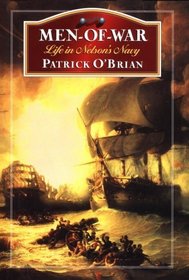If you are a fan of naval fiction from the British Age of Sail---i.e. the subtitle : "Life in Nelson's Navy"---you should read this book. It covers many of the basic terms of that age and goes so far as to even list the salaries and the percentages awarded as prize money. My only complaint is that it didn't go far enough and explain more. But thank God I wasn't serving in that Navy. I can't imagine having to memorize the name of every mast, sail and line, and this book only covered the main ones.
Nice little book on the Nelson-era navy. Not exhaustive by any means, but would be a good companion for the person just venturing into the Aubrey novels.
From the back cover:
The great guns were the man-of-war's chief armament, of course; but they were not the only weapon aboard, by any means. She also carried mustkets, for the use of the Marines and the small-arms men in the fighting-tops, pistols, axes and cutlasses for boarding, stinkballs (made of pitch, resin, brimstone, gunpowder and asafoetida in an earthenware pot: it was set on fire and thrown so as to burst among the enemy and overwhelm him with the stench), and grenades for tossing on to the enemy's deck, and boarding-pikes to repel him if he tried to come over the side. We might even add soot to the list, since Lord Cochrane, setting about the 32-gun frigate EL GAMO with his 14-gun SPEEDY in 1803, made his men black their faces in the galley before boarding, to the unspeakable dismay of the Spaniards, who yielded less to the SPEEDY'S little 4-pounders than to the truly hideous appearance of her crew.
The great guns were the man-of-war's chief armament, of course; but they were not the only weapon aboard, by any means. She also carried mustkets, for the use of the Marines and the small-arms men in the fighting-tops, pistols, axes and cutlasses for boarding, stinkballs (made of pitch, resin, brimstone, gunpowder and asafoetida in an earthenware pot: it was set on fire and thrown so as to burst among the enemy and overwhelm him with the stench), and grenades for tossing on to the enemy's deck, and boarding-pikes to repel him if he tried to come over the side. We might even add soot to the list, since Lord Cochrane, setting about the 32-gun frigate EL GAMO with his 14-gun SPEEDY in 1803, made his men black their faces in the galley before boarding, to the unspeakable dismay of the Spaniards, who yielded less to the SPEEDY'S little 4-pounders than to the truly hideous appearance of her crew.
From Amazon.com:
Any Aubrey Maturin reader determined to learn the locations of the orlop and the mizenmast, the etiquette of epaulettes, or the range of a 32-pounder will delight in this invaluable reference companion to O'Brian's epic and series. An exploration of what daily life was like in Nelson's navy, for everyone from the captain on down to the rawest recruit. Line drawings and charts help us understand the construction and rigging of the great ships, the types and dispositions of the guns, and how they operated in battle. Contemporary drawings and cartoons illustrate aspects of naval life from the press gang to the scullery. Finally, a generous selection of full-color paintings renders the majesty and the excitement of fleet actions in the age of fighting sail.
Any Aubrey Maturin reader determined to learn the locations of the orlop and the mizenmast, the etiquette of epaulettes, or the range of a 32-pounder will delight in this invaluable reference companion to O'Brian's epic and series. An exploration of what daily life was like in Nelson's navy, for everyone from the captain on down to the rawest recruit. Line drawings and charts help us understand the construction and rigging of the great ships, the types and dispositions of the guns, and how they operated in battle. Contemporary drawings and cartoons illustrate aspects of naval life from the press gang to the scullery. Finally, a generous selection of full-color paintings renders the majesty and the excitement of fleet actions in the age of fighting sail.




